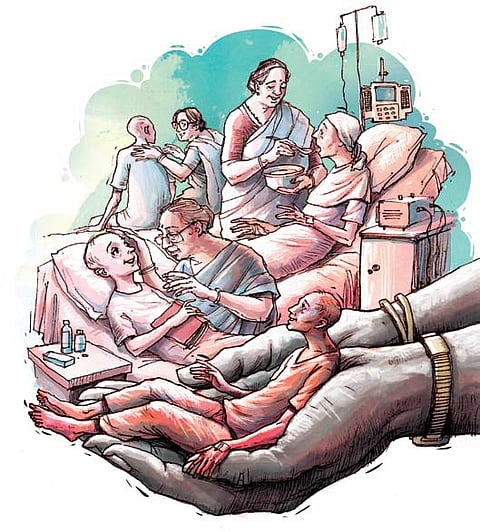

CHENNAI : As the burden of non-communicable diseases like cancer in India is increasing at an alarming pace, surpassing global rates, various researches are underway at the institutional and industrial levels across the country to improve treatment, survival rates and also make anticancer drugs affordable. The studies include immunotherapy, cellular medicine, targeted therapy focusing on genetic mutations in cancer cells and identifying and validating biomarkers.
“For the first time in India, the Indian National Paediatric Oncology Group was formed this year. Its purpose is to improve the outcome of treatment in children with cancer. All units across India will perform collaborative research with the objective to promote regionally relevant paediatric cancer research, including multi-centre clinical trials so as to generate evidence in the local population and to improve outcomes. The group hopes to provide answers on how childhood cancer in India is different and how we can make things better,” said Dr Revathi Raj, senior consultant, paediatric haematology and oncology, Apollo Cancer Centre.
“A registry is being created with all cancer diagnosed patients from Kashmir to Kanniyakumari. The group has been formed to make uniform treatment available in all government and private hospitals. Every year, around 40,000 children are diagnosed with cancer. In high income countries, the cure rate for childhood cancer is around 80%. Sadly, in India, the current survival is only 40%. The collaborative group is planning to take the cure rate to 60% by 2030. This is a significant advancement for our children, as working together is the first step,” added Dr Revathy Raj. Recently, President Droupadi Murmu launched India’s home-grown gene therapy (CAR-T cell therapy) which was developed by IIT Bombay and Tata Memorial Hospital, in association with industry partner ImmunoACT.
CAR-T cell therapy, or chimeric antigen receptor-T cell therapy, a form of immunotherapy and gene therapy is a recent advancement in cancer treatment. CAR-T cells are made by collecting T cells from patients and reengineering them in the laboratory to produce proteins on their surface called CARs. The CARs recognise and bind to specific proteins or antigens on the surface of cancer cells. They identify the targeted cell and kill it. CAR-T cell therapy was first developed in western countries and approved by the US Food and Drug Administration (FDA). Immunotherapy is mostly used in the treatment of blood cancers, not solid cancer tumours.
“Immune cells are removed from the body, genetically manipulated in a controlled setting and used for treatment because they can recognise and kill cancer cells. After mass production, the modified cells are pumped back into the patients, where they multiply and work,” said Dr Preethika Ananda, assistant professor, Centre for Clinical Trials and Research, SRM Medical College Hospital and Research Centre, Kattankulathur. Fighting cancer cells using the patient's own immune system is unique and does not carry the short and long term side effects of chemotherapy, said Dr Revathi. CAR T-cells have been used in the cancer armamentarium in high income countries for the last 15 years.
Research over the last five years on CAR T-cell therapy has resulted in India's own indigenously developed CAR T-Cell therapy, which has higher potency and the cost is reduced by 50-70%. “Surgery, chemotherapy and radiation therapy were standard treatments for cancer. Immune checkpoint inhibitors and CAR-T cell therapy are now advanced treatment modalities in cancer care. CAR-T cell therapy is effective in patients treated with immunotherapy. Apollo is also planning to expand the treatment to its centres,” said Dr Suvadip Chakrabarti, consultant in surgical oncology at Apollo Cancer Centre, Kolkata.
Dr Preethika Ananda said efforts are being made to develop targeted therapies tailored to specific genetic mutations found in certain cancers, such as breast and colorectal cancers. “Immunotherapy, especially immune checkpoint inhibitors (ICIs) for solid tumours, has become a popular oncologic treatment. The ICIs can increase survival without interruption and produce long-term, durable remission in some tumours, such as non-small cell lung cancer. Even advanced tumour patients can benefit from immunotherapy.”
Studies are also underway to identify and validate biomarkers that can aid in early detection, prognosis and treatment response prediction of various types of cancer, including ovarian and pancreatic cancers. Dr Satyajit Mohapatra, director, Centre for Clinical Trials and Research, SRM Medical College Hospital and Research Centre, said the institute is conducting phase 3 clinical trial studies on subcutaneous injection of denosumab in patients with bone metastases (a cancer complication when cancer cells from the original tumour breaks and spreads to the bones) from solid tumours and also post-marketing surveillance study of trastuzumab in female patients with breast cancer. The institute had recently received approval from the Indian Council for Medical Research to conduct phase 1 clinical trials.
Miles to go
The fourth edition of Apollo Hospitals’ flagship Health of Nation Report on World Health Day highlighted the alarming rise in cancer cases in India compared to global numbers, making India the ‘cancer capital of the world’
The National Cancer Registry Programme Report 2020 released by the Indian Council of Medical Research (ICMR) and National Centre for Disease Informatics and Research (NCDIR), Bengaluru, had estimated that in 2020 cancer cases in the country will be at 13.9 lakh and may increase to 15.7 lakh by 2025 based on current trends
According to Global Cancer Observatory (GLOBOCAN) estimates, there were 19.3 million cancer cases worldwide in 2020. India ranked third after China and the US
GLOBOCAN predicted that cancer cases in India would increase to 2.08 million in 2040